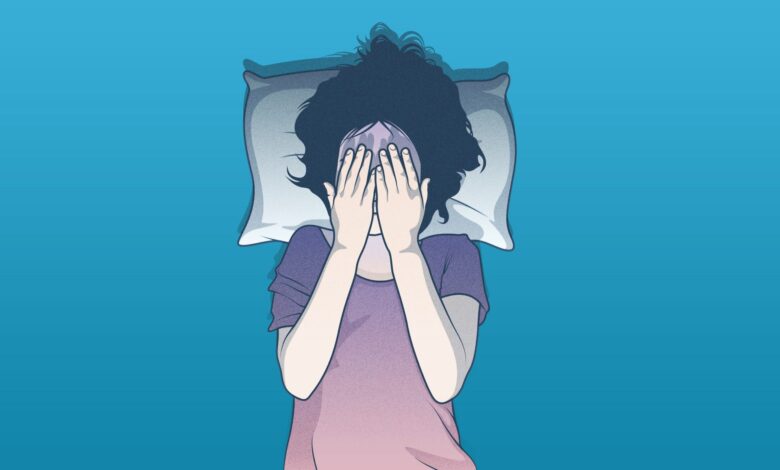The Brain’s Architecture and Function in Connection to Insomnia

Insomnia, which is characterized by difficulty falling asleep, remaining asleep, or experiencing non-restorative sleep, affects millions of individuals globally. Beyond its immediate effects on sleep quality and daytime functioning, insomnia has a dramatic effect on brain structure and function. Numerous studies on this complex relationship reveal important implications for overall health and cognitive performance.
Understanding Insomnia
Insomnia can manifest in a variety of ways; it can be an acute episode or a long-term condition that lasts for weeks, months, or even years. It could be brought on by a variety of factors, including stress, medical conditions, lifestyle choices, and mental diseases including anxiety and depression. An inability to sleep as a result of insomnia usually leads to fatigue, mood changes, blurred vision, and a reduced quality of life.
The Brain’s Response to Sleep Deprivation
Sleep is crucial for maintaining brain health because it permits critical processes like emotional regulation, memory consolidation, and synaptic plasticity. The structure and function of the brain change when chronic insomnia disrupts these processes.
Changes to the Structure
Recent studies using neuroimaging techniques like as magnetic resonance imaging (MRI) have demonstrated that insomnia can lead to anatomical changes in the brain. More precisely, there has been evidence of reduced gray matter volume in areas related to emotion regulation and cognitive processes. People with persistent insomnia show diminished volume in the prefrontal cortex, which controls executive function and decision-making. Moreover, alterations in the hippocampal region, a crucial component in memory consolidation, have been identified; these modifications could potentially contribute to the cognitive deficits experienced by individuals with insomnia.
Realistic Repercussions
Functional magnetic resonance imaging (fMRI) studies demonstrate how sleep disorders impact the patterns of brain activity throughout awake and sleep. Individuals experiencing sleeplessness often exhibit hyperactivity in the thalamus and anterior cingulate cortex, two regions associated with alertness and focus. These hyperactive tendencies during rest may be the reason for the inability to get restorative sleep and the persistence of the insomnia cycle. In addition, individuals suffering from insomnia often report disruptions in the default mode network, a crucial area for reflection and inward thinking. Patients’ abilities to process information cognitively and regulate their emotions are affected by these disturbances.
Impacts on Intelligence
Cognitive function includes a variety of mental processes, including attention, memory, processing speed, and executive function. Chronic insomnia can have an adverse effect on all these domains and ultimately lead to cognitive decline. Individuals who don’t get enough sleep often find it difficult to concentrate, decide what to do, and solve difficulties, which might impair their performance at work or in the classroom.
Education and Retention
Sleep is necessary for the process of memory consolidation, which transfers freshly learned information from short-term to long-term memory. Insomnia disrupts this consolidation process, making it more difficult to pick up new skills and remember knowledge. Research indicates that insufficient sleep may lead to abnormalities in hippocampal function, affecting memory encoding and retrieval.
Regulation of Feelings
Furthermore, sleeplessness makes it difficult to control emotions, which makes mood disorders like anxiety and depression worse. People who sleep less are more prone to emotional issues because sleep disruption upsets the neurotransmitter balance that controls mood. Individuals with chronic insomnia often exhibit high levels of stress and annoyance, which exacerbates their sleep issues.
Hazards to the Health of the Nerves
Prolonged sleep deprivation not only affects cognition but also increases the likelihood of neurological issues. Research suggests that chronic sleep disturbances may be associated with the development of diseases such as Alzheimer’s and Parkinson’s. Lack of sleep has been demonstrated to accelerate cognitive aging in the elderly and exacerbate neurodegenerative illnesses, highlighting the significance of sleep for maintaining brain function throughout life.
Strategies for Interventions and Treatment
A multimodal strategy to controlling insomnia is necessary to enhance the quality of sleep and address the underlying causes of the illness. Behavioral therapies such as cognitive behavioral therapy for insomnia (CBT-I) aim to enhance the start and maintenance of sleep by modifying sleep behaviors and promoting relaxation strategies. Pharmacological treatments, such as sedative-hypnotic medications, may be suggested for temporary relief; however, due to the potential for side effects and reliance, these treatments should be used cautiously.
Modifications to Lifestyle
Developing good sleep hygiene practices is essential for managing insomnia. This means establishing a sleeping-friendly environment, reducing alcohol and caffeine intake, maintaining a regular sleep schedule, and using relaxation techniques before bed. Exercise and stress-reduction strategies are also crucial for promoting restorative sleep.
To sum up
Insomnia has a detrimental impact on the structure and function of the brain, as well as mental clarity, emotional stability, and overall neurological health. The intricate relationship between brain health and sleep emphasizes the necessity of comprehensive management strategies and early intervention. People can improve their quality of life and brain function while lessening the negative effects of insomnia with effective behavioral, medication, and lifestyle interventions.



